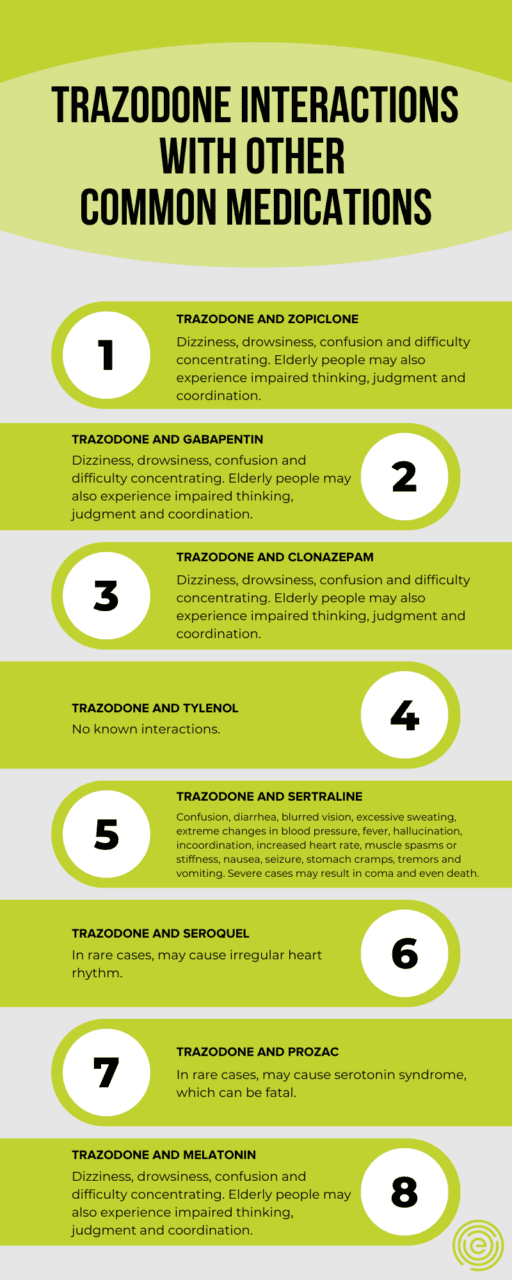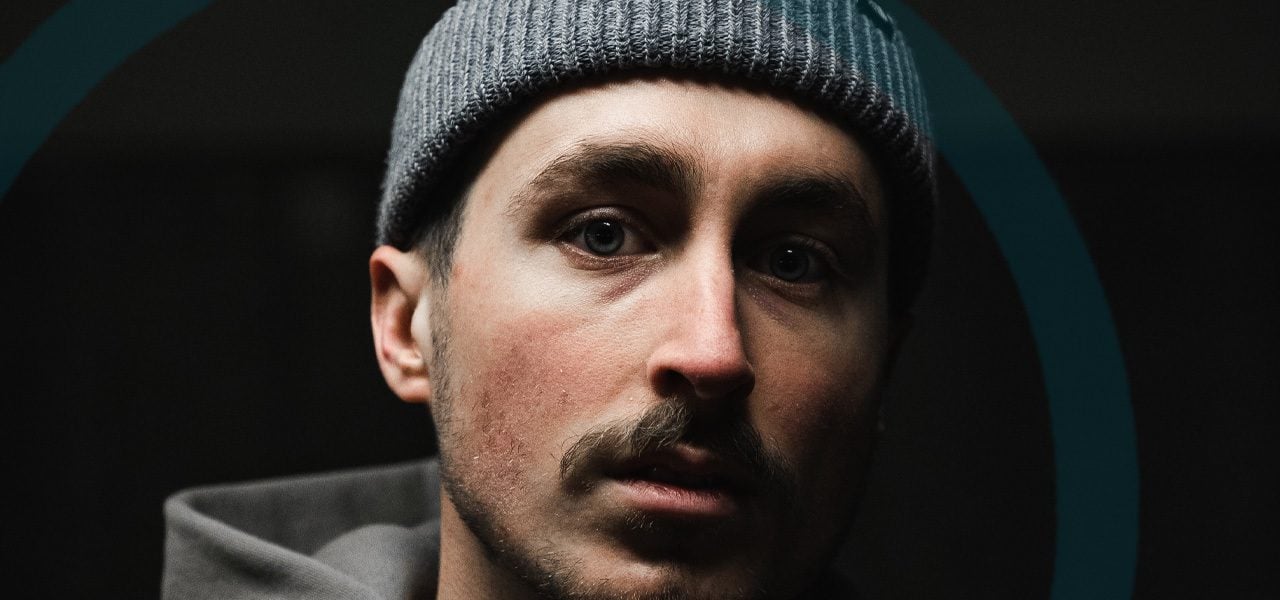Trazodone is a common antidepressant and sleep aid in treating unipolar depression and acute insomnia. It’s also helpful in treating anxiety, alcohol dependence, drug abuse, and a range of other common psychological and behavioral health issues. However, used improperly, the drug carries a significant risk of unwanted interactions and potentially serious side effects.
What is Trazodone?
Trazodone HCL is a commonly prescribed drug that first got approved for use under the name Trazorel in Canada. While Trazorel is no longer being produced, it was used for the treatment of major depressive disorder. Today it’s less often used to treat depression and anxiety, and more commonly prescribed as a sleep aid called Oleptro.
Trazodone is what’s known as an atypical antidepressant because it works somewhat differently from traditional SSRIs. Like them, it does change the chemistry of the brain to increase the available serotonin, which affects alertness, mood, and a number of other systems. Oleptro’s primary indication is for treating acute insomnia, but doctors have found off-label uses that range from managing anxiety to alcohol addiction.
Trazodone is not considered to be addictive in itself, though long-term use can cause a physiological dependence to develop. That’s why doctors usually advise against stopping its use cold turkey, and instead prefer a gradual tapering off if you’re going to stop using it. This medication is broadly considered safe when it is used as prescribed, in the amount your doctor recommends, and never combined with any of the extensive list of other substances it is likely to interact with. It should also not be taken during pregnancy, or by women who might become pregnant. If you are a woman of reproductive age, your doctor may ask about your birth control methods and counsel you to take precautions to prevent conception while you’re taking the medication.

In its most common form, the generic form of this drug comes in a white or beige pill, which may be circular or oblong, or even trapezoidal. It is often called APO trazodone because “APO” is stamped on the pill next to the dose level. Common dose strength runs from 25 or 50 mg at the low end to 300 mg on the high side. The maximum daily dosage for any kind of trazodone is 600 mg. Anything over that in a 24-hour period is considered an overdose.
Trazodone to Treat Severe Depression
Treating depression was the first approved use for Trazodone, though it is no longer the first choice for most doctors. The active ingredient in the pill is a type of agent called a serotonin receptor antagonist and reuptake inhibitor (SARI). Like the more common SSRIs and tricyclic antidepressants (TCAs), it works by affecting the way the brain handles the neurotransmitter serotonin. Unlike SSRIs and TCAs, it generally doesn’t cause insomnia and sexual dysfunction. In fact, it’s frequently the opposite, since drowsiness and priapism (prolonged erection) are among Trazodone’s side effects. Trazodone does have effects on depression and anxiety that are very similar to the other commonly prescribed drugs, but at low doses especially it may be a more tolerable option for people living with major depressive disorder.
Trazodone to Treat Alcohol Dependence
Like many sedatives and antidepressants, trazodone has been tried as a treatment for alcohol dependence under some circumstances. As late as 2006, hopes were high that Trazodone might be effective in treating the sleep disturbances that are a common symptom of alcohol withdrawal. One study found less improvement in sleep quality for a group of heavy drinkers using the drug as a sedative during their withdrawal than the placebo group showed, as well as an increase in drinking after the study period ended. This was a limited trial, however, and the authors conceded that no broad conclusions could be drawn from their work.
A much more recent study has found that Trazodone can be effective as a treatment for people experiencing delrium tremens (DTs), a well-known risk of alcohol detoxification. DTs can be fatal, and much of the medical attention people get during their early detox from alcohol is aimed at preventing serious complications from not drinking anymore. It is common for people who stop drinking after years of heavy use to be given benzodiazepines to manage DTs, but this is not always effective. The 2020 study found significant improvement for a test group who had experienced DTs as part of their detox, failed to respond to benzodiazepine treatment, and then were given up to 600 mg of Trazodone daily for as long as their symptoms lasted. The study reported less insomnia and anxiety, fewer and less severe tremors and reduced or nonexistent hallucinations among the Trazodone group. This study, like the others looking into Trazodone as a treatment for alcohol withdrawal, is not definitive, and only you and your doctor can decide whether it’s a viable option for off-label treatments like these.
Trazodone Abuse and Addiction
Trazodone is intended for long-term use, and it is not classically addictive in the sense of causing an increase in negative consequences with protracted use. People who have been taking the drug also don’t report craving it the way people addicted to narcotics do, and it does not get a user high like a more commonly abused drug might. It is nevertheless possible to become dependent on Trazodone. This comes in the form of mild-to-severe withdrawal symptoms that may drive a user to acquire the drug from sources outside of the usual clinical practice, a dangerous practice that’s responsible for many of the overdose events associated with Trazodone.
A person who has become dependent on Trazodone might decide to continue taking it for a considerable time after the initial mood or sleep issue has been resolved, simply to prevent the onset of withdrawal symptoms. Alternatively, doctors who prescribe Trazodone generally try to taper patients off of the drug, rather than withdraw it all at once. People who have a hard time dealing with the withdrawal from Trazodone, or from any other substance, can usually get help in the form of medically supervised detox and combination therapy to maintain sobriety.

Trazodone Withdrawal Symptoms
Withdrawing from Trazodone can be an uncomfortable experience. Symptoms of long-term dependence can include:
- Agitation
- Anxiety
- Confusion
- Depression
- Dizziness
- Headache
- Insomnia
- Irritability
- Nervousness
- Suicidal thoughts or self-harm
Withdrawing from Trazodone can be challenging for many people. This is partly because the symptoms are uncomfortable, but also because they can mirror the symptoms of the underlying conditions the Trazodone was prescribed to treat. If you’ve been taking Trazodone and would like to stop, be sure to consult with your doctor about potential hazards and the best strategy for managing the symptoms of withdrawal.
Withdrawal Timeline
Withdrawal affects everyone differently, and how any individual person’s withdrawal goes largely depends on how long they’ve been using the drug and what their dosage has been. At the low end, noticeable symptoms of withdrawal might last just a few days, or they could drag on for weeks. It might be possible to withdraw from Trazodone at home, with occasional contact with your doctor, or you may need to detox as part of a detox program in an inpatient setting.
Like any drug, Trazodone has a half-life inside the human body. Trazodone specifically has a half-life of 5-9 hours, which means half of the substance is gone from your body in that time. Another half of what’s left gets flushed out in another 5-9 hours. Because of this, virtually all of the Trazodone you have in your body will be gone within about 48 hours of your last dose. Factors that affect the rate Trazodone leaves your system include your metabolism, liver health, age, and extent of use.
Just because the drug has been eliminated from your system doesn’t mean that withdrawal symptoms are over. Trying to stop Trazodone use cold turkey might eliminate it from your system more quickly than a tapered approach, but it can also result in much more severe withdrawal symptoms that could make quitting uncomfortable and difficult.
Trazodone Side Effects
Just about any drug you take will have some side effects, and doctors have to balance these against the desired effects of a drug before they prescribe it. How a drug affects you depends on your genetic profile, your health, your age, and several other relevant factors. For Trazodone, some of the most common side effects include:
- Blurred vision
- Drowsiness or fatigue
- Excess sweating
- Stuffy nose and congestion
- Swelling of the hands, feet or face
- Weight loss
Trazodone has other side effects, though they are less commonly reported. These can include:
- Cardiac arrhythmia or heart palpitations
- Diarrhea or constipation
- Dry mouth
- Priapism, or an erection of the penis or clitoris that lasts longer than four hours or causes pain
- Other sexual dysfunction
Serious side effects are less common than these, but they still occur for some people. Contact your doctor or call for emergency medical attention if you take Trazodone and experience:
- Lowered sodium levels or dehydration
- Slowing heartbeat
- Pounding or very fast heartbeats, shortness of breath and/or sudden dizziness
- Vertigo or the feeling like you might pass out
- Unexplained bruising or bleeding
- Symptoms of an allergic reaction to the drug, including skin rashes and swelling of the lips, tongue or throat
Cardiac and respiratory tract issues are potentially life-threatening. Do not delay getting help if these serious symptoms occur, even if they are mild at first.
Certain groups are more likely than others to develop severe side effects from taking Trazodone. Women who are pregnant or breastfeeding are advised to ask their doctor about the risks of taking the medication.
Trazodone has a large number of potentially serious drug interactions. It is dangerous to consume alcohol at the same time you’re on Trazodone, and you should wait at least 14 days (with your doctor’s advice) after your last dose of Trazodone before starting an MAOI-class drug. Here’s a table of how Trazodone interacts with other common medications:
| Drug Combination | Common Effects |
|---|---|
| Trazodone and Zopiclone | Dizziness, drowsiness, confusion and difficulty concentrating. Elderly people may also experience impaired thinking, judgment and coordination. |
| Trazodone and Gabapentin | See above |
| Trazodone and Clonazepam | See above |
| Trazodone and Tylenol | No known interactions |
| Trazodone and Sertraline | Confusion, diarrhea, blurred vision, excessive sweating, extreme changes in blood pressure, fever, hallucination, incoordination, increased heart rate, muscle spasms or stiffness, nausea, seizure, stomach cramps, tremors and vomiting. Severe cases may result in coma and even death. |
| Trazodone and Seroquel | In rare cases, may cause irregular heart rhythm |
| Trazodone and Prozac | In rare cases, may cause serotonin syndrome, which can be fatal |
| Trazodone and Melatonin | Dizziness, drowsiness, confusion and difficulty concentrating. Elderly people may also experience impaired thinking, judgment and coordination. |

This is not a complete list of Trazodone’s interactions with every drug. Many non-prescription substances, including nutritional supplements and natural remedies, have the potential to interact with a drug. Speak with your doctor and pharmacist about the medications you’re taking with Trazodone. Never start or stop taking a prescription medication without consulting with your doctor.
How to treat Trazodone Addiction and Abuse
Though Trazodone is not associated with addiction in itself, it can cause chemical dependency. If you need help with detox from the drug, speak with your doctor about developing an outpatient treatment program. Trazodone rehab does not usually require inpatient addiction recovery to succeed, though this is an option if you need it.
Seek Professional Help
No matter how long you or a loved one have been using Trazodone, you don’t have to face rehabilitation alone. Call our helpline at 1-866-963-6343, or contact our treatment centers via our convenient online admission form.



